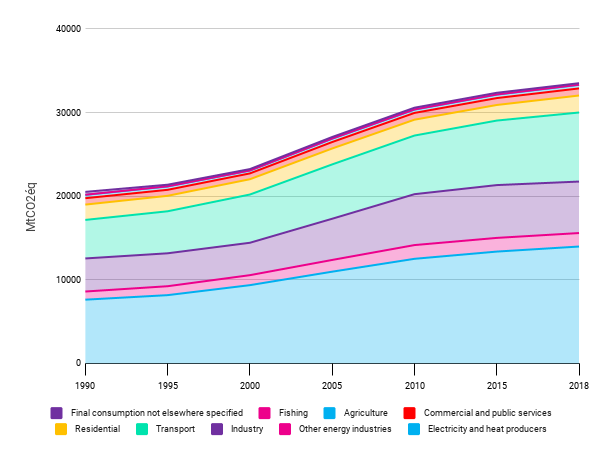
Industry is now the 4th largest sector of greenhouse gas emissions in France, accounting for 18% of the country's emissions over a year. However, most of the CO2 emissions come from the combustion of energy. Managing energy consumption is therefore a key issue in reducing the environmental impact of factories. In our e-book "The key issues for decarbonizing global industry", we propose to review the share of carbon emissions related to industrial activity in the world, and the links between carbon footprint and energy management.
In this e-book, you will discover the evolution of greenhouse gas emissions in the world and more particularly of CO2.
To download the e-book, click on this link :
Since the industrial era, global greenhouse gas (GHG) emissions have only increased. Between 1990 and 2017, global CO2 emissions have increased by 64%. Faced with the climate emergency, the European Union has set a target of reducing CO2 emissions by 40% compared to 1990 by 2030.
This measure aims to accelerate the energy transition and aims in particular to limit the combustion of fossil fuels. In fact, in 2016, 86% of CO2 emissions in the world came from fossil fuels (see graph below).

Evolution of CO2 emissions from energy combustion in the world by sector, between 1990 and 2018
(source : IEA. CO2 Emissions From Fuel Combustion. 2020).
At the global level, the production of electricity and heat is therefore a key variable in the reduction of CO2 emissions. This observation is all the more worrying as total world consumption of primary energy has been increasing since 1990. It is 1.6 times higher than in 1990 (8.7 Gtoe), which represents an average annual growth of 1.8%.
More than ever, the world's major powers must therefore set ambitious targets to halt this spiral. Download the ebook to learn more.
To receive a preview of our news, our attendance at events, we invite you to subscribe to our newsletter.
© 2021 Energiency - All rights reserved | Terms of use - Privacy policy